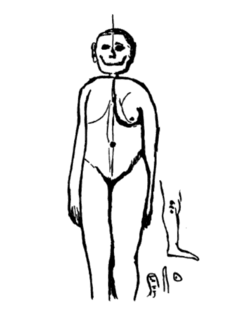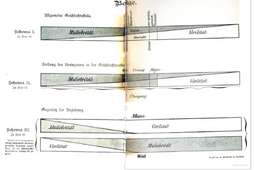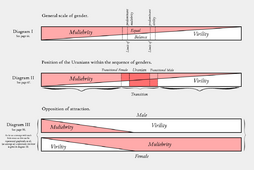Uranian: Difference between revisions
No edit summary |
imported>Armorica Online (Added section on rights and charts) |
||
| Line 1: | Line 1: | ||
{{disclaimer|This article contains terminology from the 19th and 20th centuries which some may consider outdated, insensitive, and/or offensive depending on their context or usage.}} | {{disclaimer|This article contains terminology from the 19th and 20th centuries which some may consider outdated, insensitive, and/or offensive depending on their context or usage.}} | ||
[[File:Uranian drawing.PNG|thumb|311x311px|A drawing made by Adolf, a schizophrenia patient who identified himself as Uranian, when explaining his gender identity to the psychoanalyst Dudley Ward Fay in 1922.]] | [[File:Uranian drawing.PNG|thumb|311x311px|A drawing made by Adolf, a schizophrenia patient who identified himself as Uranian, when explaining his gender identity to the psychoanalyst Dudley Ward Fay in 1922.]] | ||
'''Uranian''', or '''Urning''', was a term used during the 19th and early-20th Centuries | '''Uranian''', or '''Urning''', was a term used during the 19th and early-20th Centuries, which Karl Heinrich Ulrichs, who is believed to have coined the term, divided into separate sub-classifications, with ''Mannling'' Uranians generally describing effeminate homosexual men, and ''Weibling'' Uranians being used to describe people, who were not [[Sexes|assigned female at birth]], who identify and act female in all regards.<ref name="Ulrichs1">{{Cite book|url=http://archive.org/details/bub_gb_bAkQAAAAYAAJ|title=Forschungen über das Räthsel der mannmännlichen Liebe|last=Ulrichs|first=Karl Heinrich|date=|publisher=C. Hübscher'sche Buchhandlung (Hugo Heyn)|others=|year=1868|location=Leipzig|pages=10}}</ref> Although this distinction originally existed, by the early-20th century Uranian had become an umbrella term for effeminate, homosexual men, third gender people, and assigned men at birth who identified themselves as female, with few using Ulrichs' original sub-classifications. | ||
In Ulrichs' work where he first uses the term Urning (a German word from which the English "Uranian" is said to have derived), the separate term [[Urningin]] was proposed for homosexual, assigned female at birth people who identify and/or act in a generally-masculine way.<ref name="Ulrichs2">{{Cite book|url=http://archive.org/details/bub_gb_bAkQAAAAYAAJ|title=Forschungen über das Räthsel der mannmännlichen Liebe|last=Ulrichs|first=Karl Heinrich|date=|publisher=C. Hübscher'sche Buchhandlung (Hugo Heyn)|others=|year=1868|location=Leipzig|pages=6}}</ref> Urningin was very rarely used (if at all) in English language publications however, and its meaning was considered by some to fall within the range of meanings of Uranian on its own. | In Ulrichs' work, where he first uses the term Urning (a German word from which the English "Uranian" is said to have derived), the separate term [[Urningin]] was proposed for homosexual, assigned female at birth people who identify and/or act in a generally-masculine way.<ref name="Ulrichs2">{{Cite book|url=http://archive.org/details/bub_gb_bAkQAAAAYAAJ|title=Forschungen über das Räthsel der mannmännlichen Liebe|last=Ulrichs|first=Karl Heinrich|date=|publisher=C. Hübscher'sche Buchhandlung (Hugo Heyn)|others=|year=1868|location=Leipzig|pages=6}}</ref> Urningin was very rarely used (if at all) in English language publications however, and its meaning was considered by some to fall within the range of meanings of Uranian on its own. | ||
By the 1920s or 1930s, the term Uranian had fallen out of usage in English, most likely due to the lack of definition and general impreciseness it had acquired during the decades prior. | By the 1920s or 1930s, the term Uranian had fallen out of usage in English, most likely due to the lack of definition and general impreciseness it had acquired during the decades prior. | ||
== | ==Terminology== | ||
Uranian is believed to be an English adaptation of the German word ''Urning'', which was first published by activist [[Karl Heinrich Ulrichs]] (1825–95) in a series of five booklets (1864–65) that were collected under the title ''Forschungen über das Räthsel der mannmännlichen Liebe'' ("Research into the Riddle of Man-Male Love"). Ulrich developed his terminology before the first public use of the term "homosexual", which appeared in 1869 in a pamphlet published anonymously by Karl-Maria Kertbeny (1824–82). | Uranian is believed to be an English adaptation of the German word ''Urning'', which was first published by activist [[Karl Heinrich Ulrichs]] (1825–95) in a series of five booklets (1864–65) that were collected under the title ''Forschungen über das Räthsel der mannmännlichen Liebe'' ("Research into the Riddle of Man-Male Love"). Ulrich developed his terminology before the first public use of the term "homosexual", which appeared in 1869 in a pamphlet published anonymously by Karl-Maria Kertbeny (1824–82). | ||
The word Uranian (''Urning'') was derived by Ulrichs from the Greek goddess Aphrodite Urania, who was created out of the god Uranus' testicles; it stood for homosexuality, while Aphrodite Dionea (''Dioning'') represented heterosexuality.<ref>[http://www.mmkaylor.com Michael Matthew Kaylor, ''Secreted Desires: The Major Uranians: Hopkins, Pater and Wilde'' (Brno, CZ: Masaryk University Press, 2006)]</ref> | The word Uranian (''Urning'') was derived by Ulrichs from the Greek goddess Aphrodite Urania, who was created out of the god Uranus' testicles; it stood for homosexuality, while Aphrodite Dionea (''Dioning'') represented heterosexuality.<ref>[http://www.mmkaylor.com Michael Matthew Kaylor, ''Secreted Desires: The Major Uranians: Hopkins, Pater and Wilde'' (Brno, CZ: Masaryk University Press, 2006)]</ref> | ||
Ulrichs divided the term Uranian into two sub-classifications, the definitions of which | Ulrichs divided the term Uranian into two sub-classifications, the originally-written definitions of which are below: | ||
{{Verse translation|lang=de|italicsoff=| | {{Verse translation|lang=de|italicsoff=| | ||
| Line 24: | Line 23: | ||
}} | }} | ||
===Anna Rueling=== | == History== | ||
===Rights=== | |||
Although significant work and literature regarding Uranians was done in Germany, laws criminalizing homosexuality (specifically under Paragraph 175 of the German legal code) caused the punishment of significant numbers of people identifying as Uranian throughout the entire time period during which the term was used. German legal author Ludwig Frey protested against these regulations, writing in his 1898 book ''Die Männer des Rätsels und der Paragraph 175 des Deutschen Reichsstrafgesetzbuches'' ("The Men of Riddles and Paragraph 175 of the German Imperial Criminal Code") that the state should stop punishing Uranians on account of their gender and sexuality:<ref name="Frey">{{Cite book|url=http://archive.org/details/DieMaennerDesRaetselsUndDerParagraph175DesDeutschen|title=Die Männer des Rätsels und der Paragraph 175 des Deutschen Reichsstrafgesetzbuches|last=Frey|pages=216|first=Ludwig|publisher=Verlag von Max Spohr|year=1898|location=Leipzig}}</ref> | |||
{{Verse translation|lang=de|italicsoff=|Das Los des Urnings wird dann immer noch kein beneidenswertes sein. Derselbe wird sich nie seines Daseins wie der Normalgeschlechtliche freuen können... | |||
Eines aber, unter allen Umständen kann ihm menschlich ermöglicht werden: man kann ihn von der unnennbar quälenden Angst befreien, die ihn bis heute sein Leben lang verfolgt hat; man kann ihn der Gefahr entruecken, mit welcher ihn das von Gesetz gleichsam legitimierte Erpressungssystem bedroht... | |||
Man mache die unmöglich, indem man die urnische Liebe eben für straffrei erklärt in nicht mehr und weniger als in jenen Fällen, in denen es auch die allgemeine Liebe ist.|attr1=Ludwig Frey, ''Die Männer des Rätsels und der Paragraph 175 des Deutschen Reichsstrafgesetzbuches''<ref name="Frey" /> | |||
|The (life of the) lot of the Urnings will still not be an enviable one, as they will never be able enjoy existence as one of the normal sex does... | |||
But one thing, under all circumstances, can be humanely done for them: one can free them from the inexpressibly tormenting fear that has pursued their lives to today; one can remove them from the danger from which the blackmail system, legitimized by law, threatens them. | |||
This can be made possible by declaring Urning love to be free from punishment, punished no more and no less than any case of general love.}} | |||
<gallery widths="260" heights="170"> | |||
File:Ludwig Frey charts - original.png|Three charts featured at the end of an 1898 book written by Ludwig Frey. The middle chart, Schema II., depicts the "Organized Gender Positions of the Uranians" (''Stellung des Urningtums in der Geschlechtsreihe'') | |||
File:Ludwig Frey charts - translated.png|Translated and digitally-restored versions of Frey's charts, which (as the German did) use the terms "muliebrity" to refer to female attributes and identity, while "virility" refers to male ones. | |||
</gallery> | |||
===Individuals=== | |||
====Anna Rueling==== | |||
Lesbian activist Anna Rueling used the term in a 1904 speech, "What Interest Does the Women's Movement Have in Solving the Homosexual Problem?"<ref name="Meem">{{Cite book|url=https://books.google.com/books?id=pAny0qfa6qsC&pg=PA79|title=Finding Out: An Introduction to LGBT Studies|first1=Deborah T.|last1=Meem|first2=Michelle|last2=Gibson|first3=Michelle A.|last3=Gibson|first4=Jonathan|last4=Alexander|date=28 May 2018|publisher=SAGE|via=Google Books|isbn=9781412938655}}</ref> | Lesbian activist Anna Rueling used the term in a 1904 speech, "What Interest Does the Women's Movement Have in Solving the Homosexual Problem?"<ref name="Meem">{{Cite book|url=https://books.google.com/books?id=pAny0qfa6qsC&pg=PA79|title=Finding Out: An Introduction to LGBT Studies|first1=Deborah T.|last1=Meem|first2=Michelle|last2=Gibson|first3=Michelle A.|last3=Gibson|first4=Jonathan|last4=Alexander|date=28 May 2018|publisher=SAGE|via=Google Books|isbn=9781412938655}}</ref> | ||
===Dudley Ward Fay and Adolf=== | ====Dudley Ward Fay and Adolf==== | ||
In 1922, Dudley Ward Fay, a psychoanalyst, visited a hospital for mental illnesses where he came into contact with a person, diagnosed with schizophrenia, who identified himself as a Uranian. (Fay uses he/him pronouns in his work to refer to the individual.) As part of an agreement reached concerning publication, Fay refers to the individual as Adolf, withholding his true identity.<ref name=":0">{{Cite book|url=https://books.google.co.uk/books?id=67BIAAAAYAAJ|title=The Psychoanalytic Review|date=1922|publisher=National Psychological Association for Psychoanalysis|year=1922|location=Washington, D.C.|pages=267|language=en|volume=9}}</ref> There was no correlation between Adolf's schizophrenia diagnosis and his gender identity, with both relating to Adolf simply being a coincidence. Both before experiencing any symptoms of schizophrenia, and being released from the hospital, Adolf is reported to have made remarks and conducted himself in ways not traditionally seen as completely masculine. | In 1922, Dudley Ward Fay, a psychoanalyst, visited a hospital for mental illnesses where he came into contact with a person, diagnosed with schizophrenia, who identified himself as a Uranian. (Fay uses he/him pronouns in his work to refer to the individual.) As part of an agreement reached concerning publication, Fay refers to the individual as Adolf, withholding his true identity.<ref name=":0">{{Cite book|url=https://books.google.co.uk/books?id=67BIAAAAYAAJ|title=The Psychoanalytic Review|date=1922|publisher=National Psychological Association for Psychoanalysis|year=1922|location=Washington, D.C.|pages=267|language=en|volume=9}}</ref> There was no correlation between Adolf's schizophrenia diagnosis and his gender identity, with both relating to Adolf simply being a coincidence. Both before experiencing any symptoms of schizophrenia, and being released from the hospital, Adolf is reported to have made remarks and conducted himself in ways not traditionally seen as completely masculine. | ||
Revision as of 04:12, 22 June 2021
| |
Uranian, or Urning, was a term used during the 19th and early-20th Centuries, which Karl Heinrich Ulrichs, who is believed to have coined the term, divided into separate sub-classifications, with Mannling Uranians generally describing effeminate homosexual men, and Weibling Uranians being used to describe people, who were not assigned female at birth, who identify and act female in all regards.[1] Although this distinction originally existed, by the early-20th century Uranian had become an umbrella term for effeminate, homosexual men, third gender people, and assigned men at birth who identified themselves as female, with few using Ulrichs' original sub-classifications.
In Ulrichs' work, where he first uses the term Urning (a German word from which the English "Uranian" is said to have derived), the separate term Urningin was proposed for homosexual, assigned female at birth people who identify and/or act in a generally-masculine way.[2] Urningin was very rarely used (if at all) in English language publications however, and its meaning was considered by some to fall within the range of meanings of Uranian on its own.
By the 1920s or 1930s, the term Uranian had fallen out of usage in English, most likely due to the lack of definition and general impreciseness it had acquired during the decades prior.
Terminology
Uranian is believed to be an English adaptation of the German word Urning, which was first published by activist Karl Heinrich Ulrichs (1825–95) in a series of five booklets (1864–65) that were collected under the title Forschungen über das Räthsel der mannmännlichen Liebe ("Research into the Riddle of Man-Male Love"). Ulrich developed his terminology before the first public use of the term "homosexual", which appeared in 1869 in a pamphlet published anonymously by Karl-Maria Kertbeny (1824–82).
The word Uranian (Urning) was derived by Ulrichs from the Greek goddess Aphrodite Urania, who was created out of the god Uranus' testicles; it stood for homosexuality, while Aphrodite Dionea (Dioning) represented heterosexuality.[3]
Ulrichs divided the term Uranian into two sub-classifications, the originally-written definitions of which are below:
a) Mannlinge: Körperhabitus, d. i. der Gesammtausdruck der Bewegungen, Gebärden und Manieren, Gemüthsart, Art der Liebessehnsucht und des geschlechtlichen Begehrens: sämmtlich männlich; weiblich also nur das nackte Geschlect der Seele, weiblich nur der Liebessehnsucht Richtung; d. i. gerichtet auf das männliche Geschlecht. |
a) Mannling: [Manling] (in) body habit, i.e. the overall expression of movements, gestures, manners, mood, and the type of love-longing and sexual desire are all male; femininity is therefore only within the sex of the psyche, meaning (one is) feminine only in pursuit of longing for love; i.e. being directed towards the male sex. |
| —Karl Heinrich Ulrichs, Forschungen über das Räthsel der mannmännlichen Liebe[1] |
History
Rights
Although significant work and literature regarding Uranians was done in Germany, laws criminalizing homosexuality (specifically under Paragraph 175 of the German legal code) caused the punishment of significant numbers of people identifying as Uranian throughout the entire time period during which the term was used. German legal author Ludwig Frey protested against these regulations, writing in his 1898 book Die Männer des Rätsels und der Paragraph 175 des Deutschen Reichsstrafgesetzbuches ("The Men of Riddles and Paragraph 175 of the German Imperial Criminal Code") that the state should stop punishing Uranians on account of their gender and sexuality:[4]
Das Los des Urnings wird dann immer noch kein beneidenswertes sein. Derselbe wird sich nie seines Daseins wie der Normalgeschlechtliche freuen können... |
The (life of the) lot of the Urnings will still not be an enviable one, as they will never be able enjoy existence as one of the normal sex does... |
| —Ludwig Frey, Die Männer des Rätsels und der Paragraph 175 des Deutschen Reichsstrafgesetzbuches[4] |
Individuals
Anna Rueling
Lesbian activist Anna Rueling used the term in a 1904 speech, "What Interest Does the Women's Movement Have in Solving the Homosexual Problem?"[5]
Dudley Ward Fay and Adolf
In 1922, Dudley Ward Fay, a psychoanalyst, visited a hospital for mental illnesses where he came into contact with a person, diagnosed with schizophrenia, who identified himself as a Uranian. (Fay uses he/him pronouns in his work to refer to the individual.) As part of an agreement reached concerning publication, Fay refers to the individual as Adolf, withholding his true identity.[6] There was no correlation between Adolf's schizophrenia diagnosis and his gender identity, with both relating to Adolf simply being a coincidence. Both before experiencing any symptoms of schizophrenia, and being released from the hospital, Adolf is reported to have made remarks and conducted himself in ways not traditionally seen as completely masculine.
In an interview with his parents, Adolf was described as having "never cared much for rough and tumble play and was inclined to play indoors and read rather than mingle with studier boys outside."[7] During his late-teens, Adolf became romantically involved with several men, occasionally making remarks that less-masculine men were superior to more masculine ones. During this same period, many of his actions and decisions became more rash, eventually culminating in an episode of psychosis requiring hospitalization. During the first day of his hospitalization, Adolf revealed to his doctor that he was "of the intermediate sex (not strongly masculine)".[8] Resulting from his schizophrenia, many of Adolf's statements became progressively more unclear and nonsensical, although reflecting on his gender identity was reoccurring theme:
| « | "I'm ambidextrous, ambisextrous. I'm intermediate sex."[9] | » |
| « | [I'm] Uranian. Uranus for the benefit of the Uranians.[10] | » |
Adolf claimed to have been born with female anatomical characteristics which he claimed to have been removed by his doctors. (This is likely a delusion resulting from his schizophrenia.) There is no evidence Adolf was born with these characteristics, although by the fourth month of Adolf's observation by Fay, he seems to have identified more so as Uranian and/or female than any point previously.
Many of Adolf's statements during his hospitalization were significantly affected by his schizophrenia, although upon his release, he still considered himself to be at least somewhat less male than his peers. Begun shortly before, and continued after his release, Fay attempted to pressure Adolf toward "trying to become male", which could possibly be considered a form of conversion therapy.[11]
References
- ↑ 1.0 1.1 Ulrichs, Karl Heinrich (1868). Forschungen über das Räthsel der mannmännlichen Liebe. Leipzig: C. Hübscher'sche Buchhandlung (Hugo Heyn). p. 10.
- ↑ Ulrichs, Karl Heinrich (1868). Forschungen über das Räthsel der mannmännlichen Liebe. Leipzig: C. Hübscher'sche Buchhandlung (Hugo Heyn). p. 6.
- ↑ Michael Matthew Kaylor, Secreted Desires: The Major Uranians: Hopkins, Pater and Wilde (Brno, CZ: Masaryk University Press, 2006)
- ↑ 4.0 4.1 Frey, Ludwig (1898). Die Männer des Rätsels und der Paragraph 175 des Deutschen Reichsstrafgesetzbuches. Leipzig: Verlag von Max Spohr. p. 216.
- ↑ Meem, Deborah T.; Gibson, Michelle; Gibson, Michelle A.; Alexander, Jonathan (28 May 2018). Finding Out: An Introduction to LGBT Studies. SAGE. ISBN 9781412938655 – via Google Books.
- ↑ The Psychoanalytic Review. 9. Washington, D.C.: National Psychological Association for Psychoanalysis. 1922. p. 267.CS1 maint: date and year (link)
- ↑ The Psychoanalytic Review. 9. Washington, D.C.: National Psychological Association for Psychoanalysis. 1922. p. 269.CS1 maint: date and year (link)
- ↑ The Psychoanalytic Review. 9. Washington, D.C.: National Psychological Association for Psychoanalysis. 1922. p. 275.CS1 maint: date and year (link)
- ↑ The Psychoanalytic Review. 9. Washington, D.C.: National Psychological Association for Psychoanalysis. 1922. p. 281.CS1 maint: date and year (link)
- ↑ The Psychoanalytic Review. 9. Washington, D.C.: National Psychological Association for Psychoanalysis. 1922. p. 283.CS1 maint: date and year (link)
- ↑ The Psychoanalytic Review. 9. Washington, D.C.: National Psychological Association for Psychoanalysis. 1922. p. 323.CS1 maint: date and year (link)



